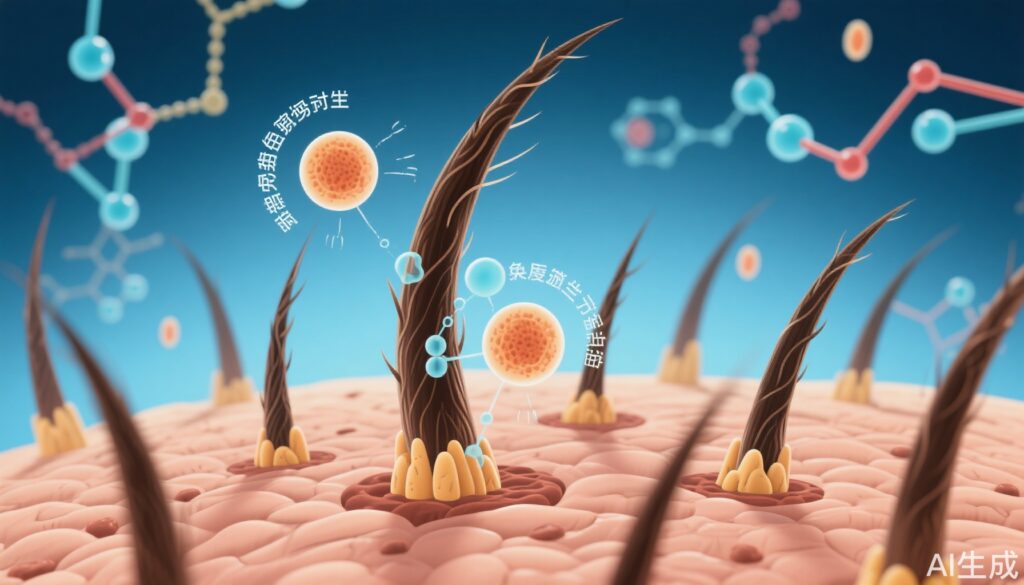Highlight
- Rezpegaldesleukin (REZPEG), a novel biologic targeting regulatory T cells, receives FDA Fast Track designation for severe-to-very severe alopecia areata in patients aged 12 and older.
- Ongoing phase 2b Rezolve AA trial is evaluating efficacy and safety using validated endpoints (SALT score) in a randomized, placebo-controlled setting.
- REZPEG offers a mechanistically distinct approach compared to JAK inhibitors, potentially addressing a high unmet need in a challenging patient population.
- Key trial results are anticipated by December 2025, and implications for practice hinge on forthcoming efficacy and safety data.
Background
Alopecia areata is an autoimmune, non-scarring hair loss disorder characterized by sudden, patchy hair loss that can progress to total scalp (alopecia totalis) or body hair loss (alopecia universalis). The clinical burden is significant: beyond the visible hair loss, affected individuals often experience profound psychological distress, reduced quality of life, and social stigma. Severe-to-very severe cases—defined as ≥50% scalp involvement—are especially challenging to treat, with limited FDA-approved therapies and frequent relapse after cessation of treatment. Recent therapeutic advances include the introduction of Janus kinase (JAK) inhibitors, yet not all patients respond, and safety concerns remain. There is thus an urgent need for novel, well-tolerated, and effective therapies that target the underlying immune dysregulation.
Study Overview and Methodological Design
The Rezolve AA study is an ongoing, multicenter, randomized, double-blind, placebo-controlled phase 2b trial evaluating rezpegaldesleukin (REZPEG) in patients with severe-to-very severe alopecia areata. Key inclusion criteria are:
- Age 12 years or older
- Body weight ≥40 kg
- Scalp hair loss involving ≥50% as measured by the Severity of Alopecia Tool (SALT) score
- No prior exposure to JAK inhibitors or other biologics
Patients (n=90) are randomized to receive one of two doses of REZPEG or placebo, administered as a self-injection. The primary efficacy endpoint is the mean percent change in SALT score after a 36-week induction period. Secondary endpoints include the proportion of patients achieving ≥50% reduction in SALT score at 36 weeks and other time points, mean percent improvement at multiple intervals, and the proportion achieving a SALT score ≤20 (indicating minimal scalp involvement).
Key Findings
As of June 2024, efficacy and safety data from the Rezolve AA trial are not yet available, with topline results expected in December 2025. However, the Fast Track designation is based on the therapy’s novel mechanism, strong preclinical rationale, and preliminary evidence from earlier phase studies and related indications (e.g., atopic dermatitis). In a similar context, other immune modulators have shown that targeting regulatory pathways can induce sustained hair regrowth in a subset of patients with extensive disease.
Mechanistic Insights and Pathophysiological Context
REZPEG is a biologic agent designed to selectively target the interleukin-2 (IL-2) receptor complex. By stimulating proliferation of regulatory T cells (Tregs), REZPEG aims to restore immune tolerance and suppress pathogenic autoreactive lymphocytes that attack hair follicles. This mechanism is distinct from JAK inhibitors, which block downstream signaling of multiple inflammatory cytokines but may also suppress broad immune function. The rationale for Treg stimulation is supported by translational and basic science studies demonstrating Treg dysfunction and reduced numbers in lesional skin and peripheral blood of alopecia areata patients.
Clinical Implications
If REZPEG demonstrates significant efficacy and a favorable safety profile, it could become a valuable addition to the therapeutic armamentarium for severe alopecia areata. The self-administered injection format may increase patient convenience, while the targeted mechanism offers potential for durable responses with fewer systemic effects. The inclusion of adolescents (≥12 years) and exclusion of prior biologic or JAK inhibitor exposure positions this therapy for use in earlier lines of treatment or for patients failing topical or conventional systemic therapies. However, head-to-head comparisons with existing agents, long-term safety, and impact on quality of life will be critical for clinical integration.
Limitations and Controversies
The main limitation at present is the lack of published phase 2b clinical data; all efficacy and safety conclusions are preliminary. The exclusion of patients previously treated with biologics or JAK inhibitors may limit generalizability to the broader, often treatment-experienced, alopecia population. Furthermore, the Fast Track designation expedites review processes but does not guarantee approval. The long-term safety of immune modulation—especially in adolescents—remains to be established, and careful post-marketing surveillance will be required.
Expert Commentary or Guideline Positioning
Recent guidelines (e.g., American Academy of Dermatology) highlight the need for individualized, evidence-based management of alopecia areata, with biologics representing a promising frontier. Dr. Brett King (Yale School of Medicine), a leading expert in hair disorders, recently commented: “The field is moving rapidly, and therapies that can restore immune balance rather than suppress immunity are especially exciting for chronic autoimmune conditions like alopecia areata.”
Conclusion
The FDA Fast Track designation for REZPEG marks a significant step forward in the quest for safe, targeted, and effective treatments for severe alopecia areata. While the mechanism is promising and aligns with emerging immunologic insights, definitive clinical data are awaited. The outcome of the Rezolve AA phase 2b study in late 2025 will be pivotal in shaping future management strategies and informing the positioning of REZPEG within treatment guidelines.
References
1. Strazzulla LC, Wang EHC, et al. Alopecia areata: An appraisal of new treatment approaches and overview of current therapies. J Am Acad Dermatol. 2018;78(1):15-24.
2. King B, Guttman-Yassky E, et al. Two phase 3 trials of baricitinib for alopecia areata. N Engl J Med. 2022;386(18):1687-1699.
3. Petukhova L, Duvic M, et al. Genome-wide association study in alopecia areata implicates both innate and adaptive immunity. Nature. 2010;466(7302):113-117.
4. American Academy of Dermatology Association. Alopecia Areata: Guidelines of care. J Am Acad Dermatol. 2020.
5. Nektar Therapeutics. Press Release: Nektar Therapeutics Receives FDA Fast Track Designation for Rezpegaldesleukin (REZPEG) for Severe Alopecia Areata. 2024.


